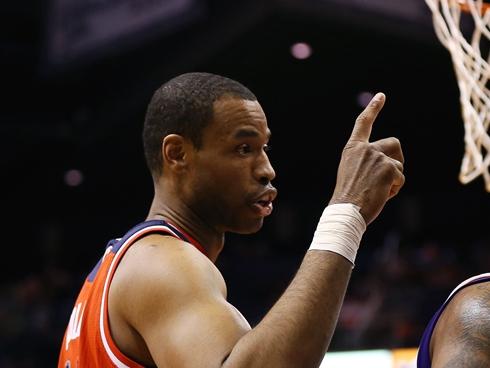
Jason Collins
Apart from writing op-ed pieces for USAToday, David Person hosts an excellent talk show on WEUP Radio out of Huntsville AL each weekday. David and I do a segment together every Thursday at 5:00 even when I’m on the road and in unlikely spots like prison parking lots or a roadside McDonalds. He thinks Jason Collins will face the same kind of challenges that Robinson encountered back in the day. We have accepted black athletes; in fact, in many popular sports the majority of competitors are black. But are we ready for openly gay basketball and football players?
Jason Collins walks in Robinson’s path
David Person, USAToday
First openly gay active male athlete in a major sport can confront backlash like number 42.
At a moment when baseball Hall-of-Famer Jackie Robinson is being celebrated in the popular biopic 42, another professional athlete has taken a step that will break down social barriers.
Jason Collins, a free-agent center in the NBA, announced that he is gay in an essay that was published on the Sports Illustrated website on Monday.
As the first openly gay active male U.S. athlete in a major sport, Collins, 34, a 12-year veteran, is entering uncharted territory just as Robinson did 66 years ago. And though a lot has changed since the hostile Jim Crow-era in which Robinson entered the Major Leagues as the first African-American baseball player, the 21st century has not been very welcoming to lesbian, gay, bisexual and transgender (LGBT) people.
Mixed reaction
Yes, NBA stars such as Kobe Bryant and Baron Davis tweeted their support to Collins. Yes,President Obama called him to express his admiration and support. And former president Bill Clinton tweeted he was proud to call Collins a friend.
But a few attaboys in cyberspace is not the locker room, where some teammates could be less accepting of Collins. Nor is it the arena, where some fans might shout their displeasure.
While the NBA, NHL and NFL have developed programs and partnerships to encourage tolerance of LGBT people, professional sports is still the last frontier for raw expressions of traditional masculinity.
The long-held aversion to gay athletes isn’t only in the locker room, as comments made Monday by ESPN basketball analyst Chris Broussard indicated.
“I’m a Christian,” Broussard said on his network. “I don’t agree with homosexuality. I think it’s a sin, as I think all sex outside of marriage between a man and a woman is.”
Because the NBA is not a theocracy, Broussard’s opinion will remain just that. And it should be noted that not all Christians address this issue the way Broussard has or agree with his conclusions. But the broadcaster’s jeremiad points to the challenge awaiting Collins, who by the way, is also a Christian.
In the Sports Illustrated essay, Collins wrote about a visit he made to the Martin Luther King Jr. Memorial in Washington, D.C. “I was inspired and humbled,” he said. “I celebrate being an African American and the hardships of the past that still resonate today. But I don’t let my race define me any more than I want my sexual orientation to. I don’t want to be labeled, and I can’t let someone else’s label define me.”
Historical examples
The history of this great nation can’t be written without acknowledging that majorities have always tried to define minorities. Sometimes through laws, and other times through social mores and even brutality, groups and individuals have been labeled and forced into second-class status because their race, ethnicity, gender or sexual orientation was deemed inferior.
Whether it’s caustic, profane insults or biblical denunciations, Collins would do well to use Robinson as his role model once he signs a new NBA contract and plays next season. Just like No. 42, if Collins has the guts not to dignify bigotry with an angry or equally offensive response, he will empower other LGBT athletes who yearn to come out — and their straight allies who want to support them.
David Person hosts the WEUPTalk radio program in Huntsville, Ala., and is a member of USA TODAY’s Board of Contributors.
